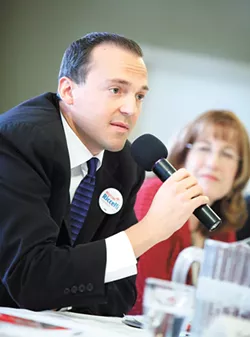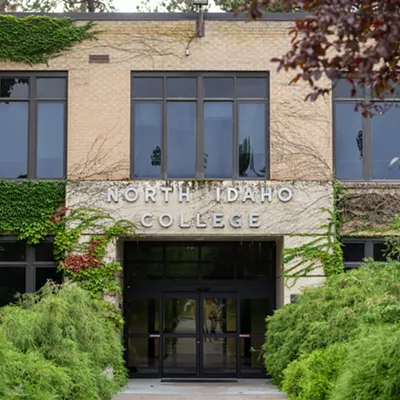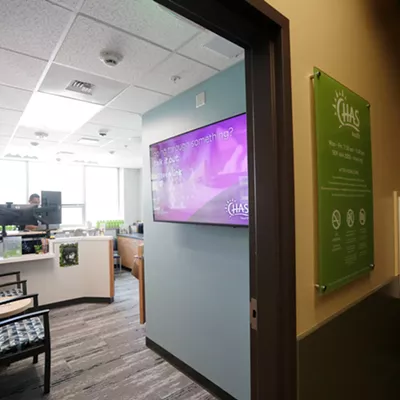WHAT'CHA GONNA DO?
Police officers see people during what are arguably the lowest points in their lives — in the throes of domestic violence, mental illness, homelessness and drug addiction.
So should a person have control over whether those scenes are broadcast live across the country? And should a government be allowed to censor the reality of what its officers see every day?
Those are two major questions driving an ordinance recently proposed in the city of Spokane that would restrict how REALITY-BASED POLICE SHOWS interact with local law enforcement.
"To me it's shocking that they don't have to get people's permission," City Council President Ben Stuckart says of shows like COPS and Live PD. "I think it's only fair that a company filming and making money off you should have to ask your permission."
The ordinance would require any company that films police within Spokane city limits to get a business license with the city and purchase liability insurance. The ordinance would also require that the company get consent from those being filmed and agree to allow city officials to review footage before it's broadcast. As written, the ordinance applies to police working in the city's limits, regardless of which agency the film crew is following.
Spokane County Sheriff Ozzie Knezovich says the ordinance is an attempt to hide the realities of police work and questions how a city law could control crews embedded with his office.
"I'm confused about the censorship that Mr. Stuckart is trying to push onto the citizens," Knezovich says. "It's real. Nobody's making that stuff up. It's what the people are dealing with and what we're dealing with."
For the past two seasons, film crews with Live PD have embedded with Spokane County deputies, including those who work in the Spokane Valley. The show is among the highest rated on cable TV.
Knezovich says the exposure has been a boon for recruiting efforts. The show also pays deputies' overtime, if there is any, he says. Although the sheriff has decided to take a break this season, he expects film crews will resume with his office later this spring.
The Spokane Police Department has not been featured on Live PD, but the show COPS has filmed city officers in the past.
"We're not banning them like some other communities have done," Stuckart says of the ordinance. "Life is messy, but I think you have a right to say whether the worst day of your life is broadcast on TV or not." (MITCH RYALS)
TAKE HOME DRUGS
Last year, the Inlander spoke to Darin Neven, Sacred Heart emergency room doctor, for an investigation on how Spokane was tackling the OPIOID CRISIS. One of the things he mentioned was how doctors at Sacred Heart used to hand a drug called Narcan directly to overdose victims to let them take home. Narcan can save lives, essentially reversing an opioid overdose.
But in 2015, a state Pharmacy Quality Assurance Commission rule banned hospitals from giving patients pre-packaged take-home medications. The legislature created an exception, but only for hospitals without access to 24-hour pharmacies.
But after the Inlander asked Rep. Marcus Riccelli about the issue, Riccelli started looking into it. It was a head-scratcher, he says. Nobody saw any reason not to create an exception for Narcan.
In an omnibus opioid bill, HB 2489, that passed out of a House committee last week, Riccelli added language that would allow ER doctors like Neven to once again hand patients Narcan packages to take home.
"This is just one of those common sense deals that make sense," Riccelli says. "This is an easy fix. Hopefully, it will save lives."
The bill also includes a broad package of other reforms, including improving the state's prescription monitoring program and rolling out a new model for opioid-assisted treatment programs. (DANIEL WALTERS)
'A BIG STEP'
Last week, the Washington State Senate passed a bill that would require all health insurance plans that offer maternity care in the state to also cover abortions, and cover comprehensive contraception with no cost sharing.
Senate Bill 6219, which Democrats dubbed the REPRODUCTIVE PARITY ACT, passed 26 to 22 in the newly Democratically controlled chamber, with one Republican voting for it, one Democrat voting against it, and one Republican excused.
The move was applauded by progressives and women's health organizations who said the bill, several years in the making, puts women's health decisions in their own hands.
"This is a big step for Washington state," says Paul Dillon, director of public affairs for Planned Parenthood of Greater Washington and North Idaho. "No woman's pregnancy decision should be affected by their inability to pay for care."
But conservatives said the bill infringes on the rights of people who don't want to pay into an insurance pool that covers abortion.
"The underlying bill forces those of us who believe abortion takes a life to pay for people making that decision," said Sen. Mike Baumgartner, R-Spokane, during floor debate of the bill.
Baumgartner introduced three amendments that would have prevented any health plans from covering abortions based on gender, Down syndrome or sexual orientation, but all failed.
The bill is now in the House, where it was scheduled for a hearing on Wednesday. (SAMANTHA WOHLFEIL)

























